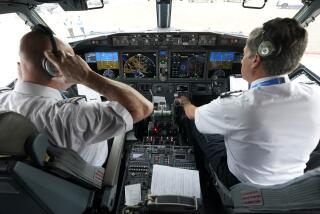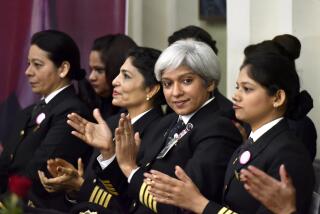Market Scene : Gender Wars Are Taking to the Skies Over India : Male pilots are angry that some stewardesses are paid more. In protest, some men refuse to fly.
- Share via
NEW DELHI — In India, the battle of the sexes has reached stratospheric heights, with unionized pilots and flight attendants of the state-owned domestic air carrier, Indian Airlines, locked in an angry squabble about salary and titles.
The pilots, all men, are up in arms that a few senior cabin personnel, most of whom are women, have received a larger base salary than some rookie co-pilots. In protest, the pilots have refused to fly on the same aircraft with the senior flight attendants.
Since the dispute erupted earlier this month, the airline, which already was facing heavy market turbulence in competition with new private carriers, has canceled at least 20 flights and had a similar number delayed, in some cases for three hours, managers say.
Kanchan Khanna, who has 25 years of experience, was caught in the dispute. On June 7, the New Delhi-based flight attendant was supposed to work the New Delhi-Bombay flight. But the 22-year-old co-pilot, Capt. Akash Sharma, informed the airline’s Movement Control office that he wouldn’t take off if she was aboard, Khanna said.
“I was put off the flight because of him,” Khanna, still fuming, recalled in an interview. She believes the core issue is one of sexism in a country where women traditionally have played a subservient role to men.
“It’s a kind of envy they have. And it’s not concerned with one individual woman,” Khanna said. “They feel, why should we earn more? In India, if your wife gets a better pay packet, then you are hurt.”
The National Commission for Women agreed, blasting the pilots’ union for causing “indignity, insult and humiliation to women as a class.” The pilots, it charged, were engaging in “subversion” of India’s constitution, which guarantees all citizens freedom to engage in any profession.
The dispute began June 6, when the Indian Commercial Pilots Assn. issued instructions to 256 member pilots with the airline not to fly with seven senior flight attendants who had been granted the title of “deputy manager” and given corresponding raises.
Cabin personnel struck back by warning the pilots that they would walk off en masse if one of their colleagues was not allowed to board.
Also, “we will retaliate by refusing to serve them [the pilots] tea on board [or] load their baggage,” said R. Ramanathan, general secretary of the Air Corporations Employees’ Union, which represents flight attendants and ground personnel.
The absurdity of the dispute, Indian Airlines officials say, lies in the fact that the flight attendants don’t really get paid more. In January, 1994, 33 of the most senior cabin personnel, only four of whom are men, were named deputy managers and given raises bringing their monthly base salary to as much as $121.70, airline officials said.
True, the officials said, junior co-pilots with less than three years and two months of service start work at as little as $82.50 a month. But bonuses and allowances boost the beginners’ average monthly take-home pay to $1,000, and often more.
“No first officer costs less than a stewardess,” R.N. Pathak, Indian Airlines deputy general manager, stressed. “With all their emoluments, like the tax-free flying allowance, they would be drawing four or five times more.
“What is in the back of their mind is to get a raise,” the airline executive said. “All this boils down to money. Money and nothing but money.”
Unfortunately for Indian Airlines, the well-publicized dispute, just one of several bones of contention between it and the pilots, is occurring just as domestic market share seemed to be rebounding. In May, the airline, which serves 53 cities in India with a fleet of 58 Boeing 737s, Airbus A-320s and A-300s, carried more than 23,000 passengers a day, up more than 1,000 from the previous May.
Now each time a flight is canceled, because of the argument over pay scales, and titles, the airline loses about $10,000, managing director P.C. Sen said. To try to force the pilots back into line, the airline has warned that if they “offload” flight attendants listed on duty rosters, they will be subject to internal inquiries.
“We have been suffering insult and indiscipline for the last six months. It’s time we took action,” Sen explained. But company officials admit that, because of Indian laws, it would be very hard, and perhaps impossible, to fire a pilot involved in the protest.
“It’s a long, drawn-out process,” a company official said. “We really don’t want to get into that.”
Meanwhile, the flying public has shown little sympathy for the unhappy men in the cockpit. On one Calcutta-to-Dhaka flight that was delayed while pilots and flight attendants argued, impatient passengers demanded the pilots settle the dispute on their own time. The plane finally took off two hours late, after a senior flight attendant based in Calcutta, 32-year veteran Nilika Roy, was stricken from the duty roster by the pilot, Capt. G. Shome.
The pilots claim they are misunderstood and are being portrayed as the bad guys because of confrontational tactics by Indian Airlines management. Giving some cabin personnel managerial titles and more money than co-pilots undermines the latter’s authority and threatens the chain of command, they claim.
“The cabin crew is not important to running an airline. Pilots are,” Capt. S. Dinakar, general secretary of the pilots union, said. “How can they compare a co-pilot to someone who only serves coffee, tea and keeps the passengers comfortable?”
Talks between the pilots’ union and management broke down last Thursday. The pilots are also demanding that the airline stop hiring outsiders on contract, and they want the same bonuses for Indian Airlines pilots as those given by the other state-owned carrier, Air-India, for flights overseas.
Though denying that sexual politics plays any part in the dispute, Dinakar involuntarily lent credence to Pathak’s contention that the pilots stirred up the brouhaha to push for more money for themselves.
“We are also human beings,” the Madras-based Dinakar observed. “If someone gets a Maruti car, we should also get a Maruti car.”
Offended by the pilots’ arguments that she and her colleagues are nothing more than “servants,” Khanna said the controversy has poisoned the working atmosphere on Indian Airlines flights and relations between the 425 pilots and 1,025 cabin personnel.
“We used to eat at the same table,” Khanna said. “But now, they just talk in terms of money.”
More to Read
Sign up for Essential California
The most important California stories and recommendations in your inbox every morning.
You may occasionally receive promotional content from the Los Angeles Times.










